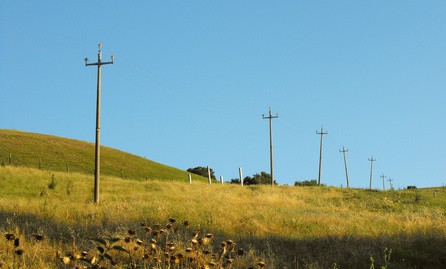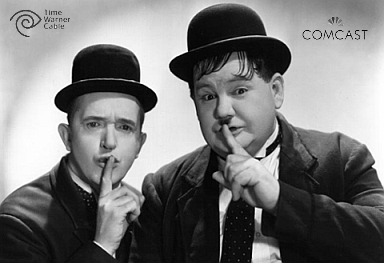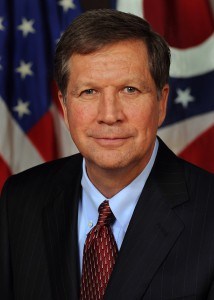 Time Warner Cable has appealed to the Secretary of the New York Department of Public Service to keep information about taxpayer-subsidized broadband expansion projects in New York a secret.
Time Warner Cable has appealed to the Secretary of the New York Department of Public Service to keep information about taxpayer-subsidized broadband expansion projects in New York a secret.
The case is part of a series of ongoing requests for disclosure of information about the proposed merger of Comcast and Time Warner Cable under New York’s Freedom of Information Law.
Several public interest groups are requesting copies of documents submitted to the state Public Service Commission that the two cable operators have repeatedly asserted should remain confidential. Gerald Norlander from the Public Utility Law Project has been seeking details about how the two companies plan to address New York’s rural broadband dilemma before any decision about the merger is made by state regulators. Norlander requested copies of documents that include details about Time Warner’s taxpayer-subsidized rural broadband expansion under the auspices of Gov. Cuomo’s Connect NY program. Time Warner wants to keep the information confidential, citing competitive concerns.
New York Administrative Law Judge David L. Prestemon ruled earlier this month that while Time Warner could maintain secrecy in the early stages of its proposed expansion efforts, once the company disclosed details about a project in a public filing with state or local officials, confidentiality should be lifted.
 Prestemon rejected efforts by Time Warner Cable to maintain confidentiality even after news of one broadband expansion project was reported by Albany-area media outlets. Prestemon added that public regulatory filings submitted by the company as a project commences effectively places information about it in the public domain.
Prestemon rejected efforts by Time Warner Cable to maintain confidentiality even after news of one broadband expansion project was reported by Albany-area media outlets. Prestemon added that public regulatory filings submitted by the company as a project commences effectively places information about it in the public domain.
Counsel for Time Warner Cable rejected that assertion, claiming information found in certain regulatory filings or in a newspaper article lacks the granularity sought by Time Warner’s competitors.
“Simply because physical construction begins on a project does not mean that the public or competitors would be aware of who is completing the project, the geographic extent of the project, the number of passings, or the estimated completion date,” argued Maureen O. Helmer and Laura L. Mona in an appeal filed by Time Warner’s legal team at Hiscock & Barclay, LLP. “This information would be difficult and costly for a competitor to compile, such that disclosure would significantly harm Time Warner Cable’s competitive advantage.”
The attorneys revealed Time Warner Cable’s use of subcontractors is already helping shield the company from having expansion projects become public knowledge:
Time Warner Cable typically uses subcontractors to complete the physical construction. Therefore, the vehicles used to construct the build-out are often not Time Warner Cable owned vehicles. While Time Warner Cable generally requires contractors to display signs stating “Contractor for Time Warner Cable,” the existence of construction vehicles on the side of a road would not convey to an average member of the public or a competitor that Time Warner Cable was engaged in construction of new facilities, as opposed to repair, maintenance, or some other activity. In similar fashion, if a Time Warner Cable vehicle was present on the side of a road, it would not mean that a new build-out was being constructed as the vehicle could be performing any number of tasks that would not be known to the public.
Norlander’s group is concerned Comcast intends to combine Time Warner Cable’s systems in New York and could focus entirely on large urban markets while potentially abandoning rural customers to maximize revenue.
This is the third time Time Warner Cable has appealed one of Judge Prestemon’s rulings on this subject.


 Subscribe
Subscribe New York Gov. Andrew Cuomo has set a goal that every resident of New York State should have access to at least 100Mbps broadband no later than 2018.
New York Gov. Andrew Cuomo has set a goal that every resident of New York State should have access to at least 100Mbps broadband no later than 2018.
 That must come as a relief for Verizon. The state’s largest phone company has petitioned state officials in the past for a gradual mothballing of New York’s rural landline network in favor of switching customers to wireless voice and broadband over Verizon’s cellular network. Theoretically, taxpayers could end up subsidizing the demise of rural New York landlines and DSL if Verizon seeks money from the rural broadband fund to expand its wireless tower network in rural New York. Time Warner Cable almost certainly will also seek more funding, probably in excess of the average $1,264 paid to the cable company for each of the 4,114 additional connections it agreed to complete during an earlier round of funding.
That must come as a relief for Verizon. The state’s largest phone company has petitioned state officials in the past for a gradual mothballing of New York’s rural landline network in favor of switching customers to wireless voice and broadband over Verizon’s cellular network. Theoretically, taxpayers could end up subsidizing the demise of rural New York landlines and DSL if Verizon seeks money from the rural broadband fund to expand its wireless tower network in rural New York. Time Warner Cable almost certainly will also seek more funding, probably in excess of the average $1,264 paid to the cable company for each of the 4,114 additional connections it agreed to complete during an earlier round of funding.
 “The telecommunications language will force the governor to veto this bill, as he has personally said and has also been repeated several times by other members of the administration,” Jim Zehringer, director of the Ohio Department of Natural Resources told the Ohio Senate’s Agriculture Committee during an informal hearing on the legislation. “We would be sacrificing all the great work done so far on this bill if these provisions are not removed.”
“The telecommunications language will force the governor to veto this bill, as he has personally said and has also been repeated several times by other members of the administration,” Jim Zehringer, director of the Ohio Department of Natural Resources told the Ohio Senate’s Agriculture Committee during an informal hearing on the legislation. “We would be sacrificing all the great work done so far on this bill if these provisions are not removed.” AT&T CEO Randall Stephenson’s public hissy fit against the Obama Administration’s sudden backbone on Net Neutrality may complicate AT&T’s plans to win approval of its merger with DirecTV. forcing AT&T to retract threats to suspend fiber buildouts if the administration moves forward with its efforts to ban Internet fast lanes.
AT&T CEO Randall Stephenson’s public hissy fit against the Obama Administration’s sudden backbone on Net Neutrality may complicate AT&T’s plans to win approval of its merger with DirecTV. forcing AT&T to retract threats to suspend fiber buildouts if the administration moves forward with its efforts to ban Internet fast lanes.
 Cable One’s history as a former part of the Washington Post and its publishers — the Graham family — will come to an end next year as it is
Cable One’s history as a former part of the Washington Post and its publishers — the Graham family — will come to an end next year as it is 